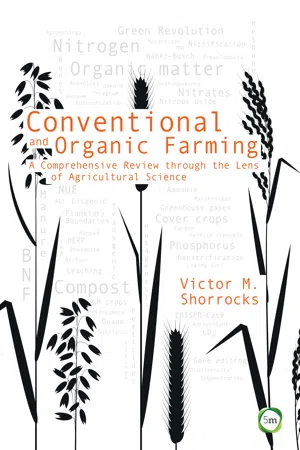
Conventional and Organic Farming: A Comprehensive Review through the Lens of Agricultural Science
- English
- ePUB (mobile friendly)
- Available on iOS & Android
Conventional and Organic Farming: A Comprehensive Review through the Lens of Agricultural Science
About This Book
Organic farming comes with many connotations of 'natural', 'wholesome', 'healthy', 'superior', 'environmentally friendly', and 'sustainable'. But just what is the scientific evidence behind the claims of healthier food and better farming systems made by the organic movement?Using peer reviewed literature, the latest studies and a rigorous investigation of claims made by opponents of conventional farming, the author provides an even handed and scientifically objective review of the contributions of organic farming to human health, crop yields, the environment and agriculture from a global perspective.The aim is to separate out the marketing spin, the claims of one camp or another and political ideologies to provide a straightforward appraisal of both the benefits and exaggerated claims of organic farming. The approach taken is to present the evidence – in the form of data, study results and presentation of source material for the claims made by conventional and organic, and leave the reader to make their own judgements on the validity of the case for organic over conventional farming.The book also addresses a fundamental question in modern farming – organic agriculture's ability to feed the world in the face of a growing population and growing demand for meat, and provides a timely scientific comparison of the practices, relative yields and benefits of organic versus conventional agriculture. The ways conventional farming has progressed from hunter gatherer days and possible future developments are discussed.Conventional and Organic Farming is an ideal book for agricultural policy makers, researchers and academics, as well as agricultural students, conventional and organic farmers.
Frequently asked questions
Information
Table of contents
- Cover
- Half Title
- Title
- Copyright
- Contents
- Author’s Foreword
- Acknowledgements
- Biographical Notes
- Part 1 From Hunter Gatherers to Agricultural Science
- Part 2 The Nature, Origin and Benefits of Organic Farming
- Part 3 Comparison of Organic and Conventional Farming
- Part 4 Nitrogen: the All-Important Element
- Part 5 Sustaining Adequate Food Production and the Future
- Appendix
- Glossary
- Epilogue
- Index